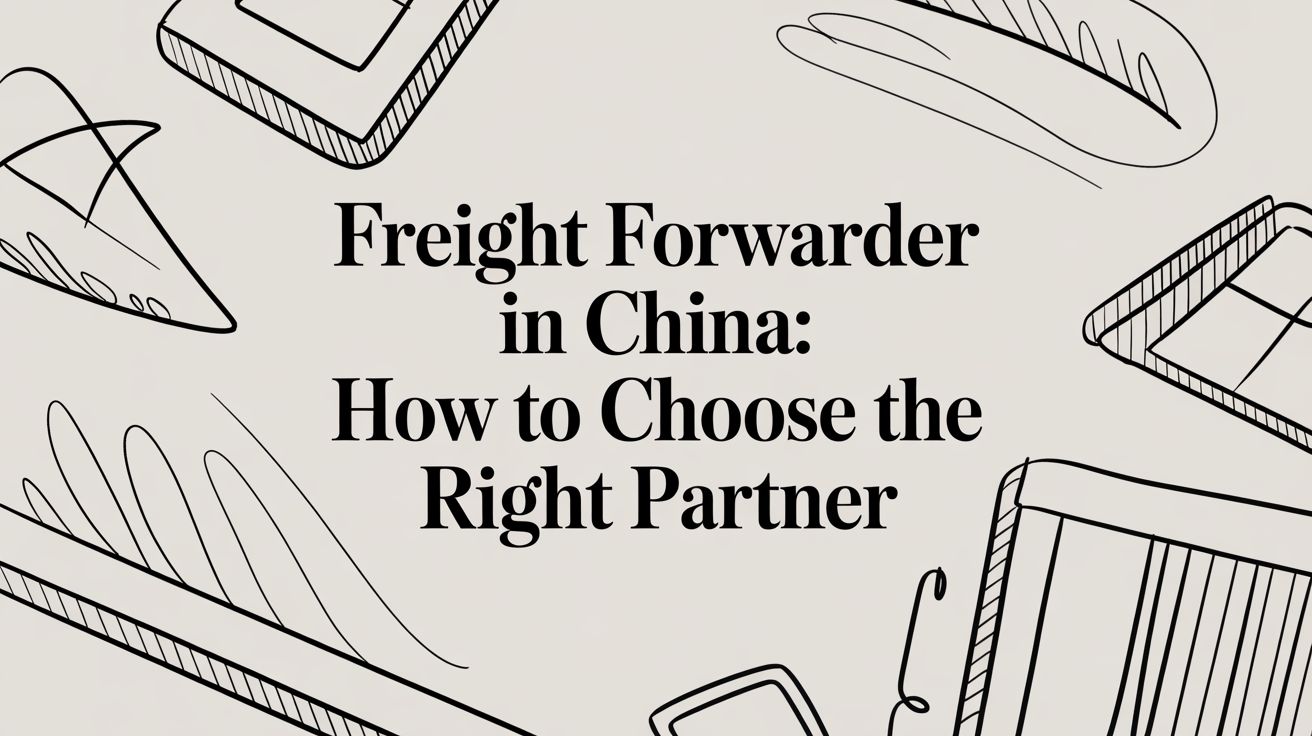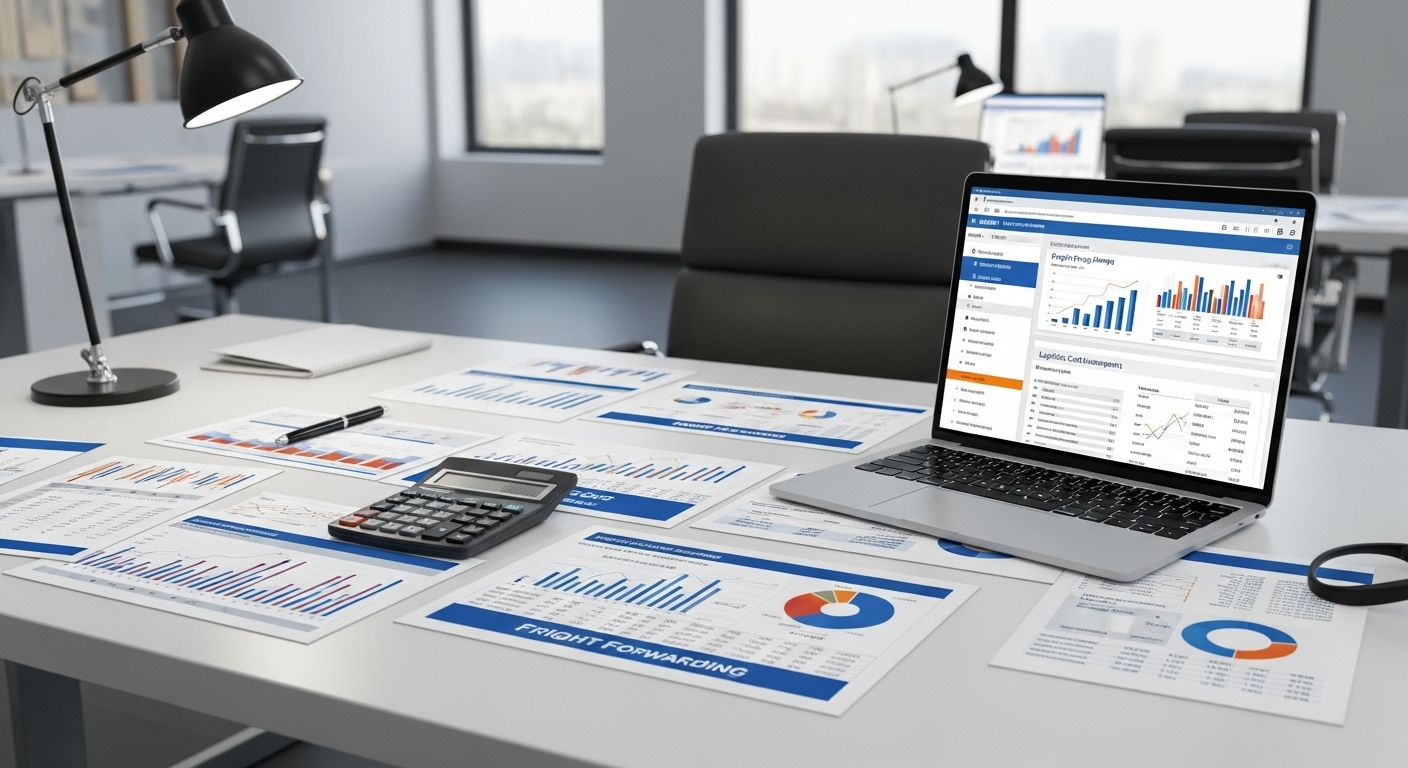Choosing the right freight forwarder in China isn't just another box to tick on your logistics checklist. It's a foundational business decision that can make or break your entire supply chain. This partner is your expert on the ground, the one who navigates a notoriously complex market to protect your investment and get your goods where they need to be, safe and sound.
Your Freight Forwarder Is Your Most Important Partner
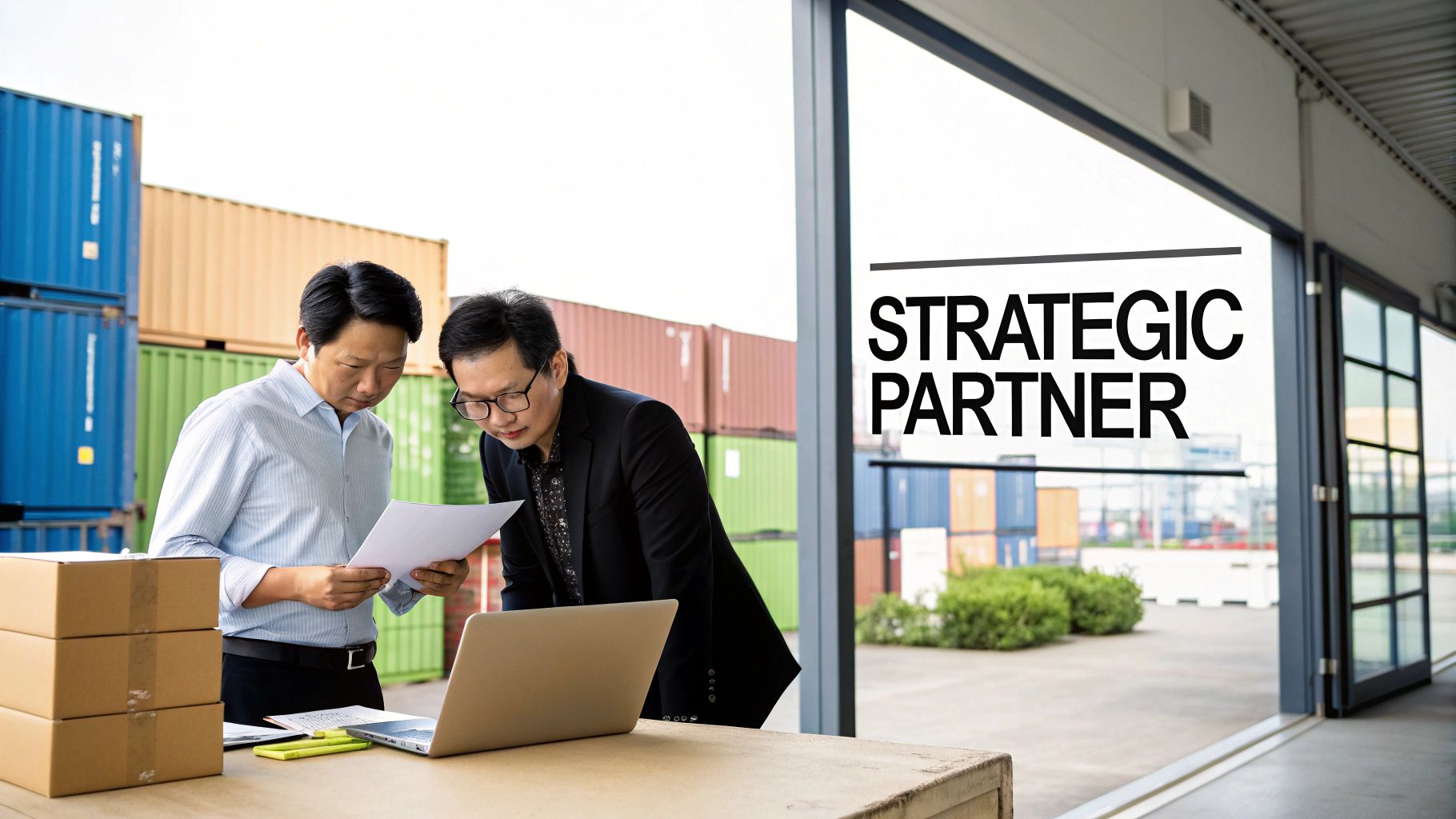
Stop thinking of your freight forwarder as just a service provider. They are a strategic asset. In the world of international trade, things go wrong. Your forwarder is your first line of defence against the costly delays, surprise fees, and logistical nightmares that can hamstring a business. A solid partnership here can turn your supply chain from a constant headache into a real competitive advantage.
A forwarder’s job is to conduct the entire orchestra of moving your products, mastering all the fine points of international supply chain management. Their real value shines when the unexpected happens. Picture this: a sudden port strike threatens to hold up your shipment for weeks, putting a critical product launch at risk. A seasoned forwarder won't just tell you there's a problem; they'll already have a backup plan in motion, rerouting your cargo through a different port to keep you on schedule.
Navigating Local Complexities
The Chinese market has its own unique set of rules and challenges. An experienced local partner is built to handle these hurdles, which go far beyond just booking a container.
- Language and Cultural Barriers: A simple misunderstanding with a supplier or a government official can spiral into a major mistake. A local forwarder acts as your translator and cultural liaison, making sure everyone is on the same page.
- Complex Customs Regulations: China's customs rules can be a moving target—they're often unclear and can change without warning. I’ve seen a good forwarder save a client from six-figure fines simply by catching a misclassification on a commercial invoice before it was ever submitted.
- Local Business Nuances: Knowing the ins and outs of local customs, major holidays like Golden Week, and the best regional transport networks is absolutely critical. Your forwarder is your insider, catching potential issues long before they become expensive problems.
This local expertise is set against the backdrop of China's immense and growing logistics infrastructure. The market was valued at over USD 1.7 trillion in 2022 and continues to expand under massive projects like the Belt and Road Initiative, which has linked China to over 140 countries. This growth makes China a global logistics powerhouse, but it also makes having an expert freight forwarder more essential than ever.
A great freight forwarder does more than move boxes; they move your business forward. They manage risk, protect your investment, and provide the stability needed to build a resilient and profitable supply chain from China.
At the end of the day, picking a forwarder just because they offer the lowest price is one of the most common and costly mistakes you can make. The real value is in their reliability, expert advice, and knack for solving problems before you even know you have one. That’s the kind of partnership that lets you focus on growing your business instead of constantly putting out logistical fires.
How to Vet a Chinese Freight Forwarder
Picking a freight forwarder in China can feel overwhelming. You’re not just looking for a service; you’re looking for a partner. With tens of thousands of options, the challenge isn’t finding a forwarder, but finding the right one—a professional who won't put your entire supply chain at risk.
This means you need to do more than just compare quotes. You need a solid vetting process to dig into their qualifications, the strength of their network, and how they handle things when they inevitably go wrong.
Think of it like hiring a critical team member, because that's exactly what this is. Your forwarder is your eyes and ears on the ground, and they need to prove they have the chops to manage your cargo reliably.
Check for Essential Licenses and Insurance
Before you even get to pricing, you need to verify their credentials. This is your first and most important filter.
In China, the big one is the China NVOCC (Non-Vessel Operating Common Carrier) license. This is issued by the Ministry of Transport and proves they are a legitimate company authorised to issue their own Bills of Lading. No NVOCC license? That's a huge red flag.
Next, look for international accreditations. Are they a member of a global network like WCA or FIATA? This isn't just a logo for their website; it shows they meet international standards and have a network of trusted agents across the globe. That network is what makes smooth door-to-door shipping possible.
Don't just take their word for it—ask for copies of their licenses and certificates. A reputable freight forwarder in China will provide this documentation without hesitation. It’s a simple request that quickly reveals their professionalism.
Finally, bring up cargo insurance. A carrier's liability is shockingly low and will almost never cover the full value of your goods if they get lost or damaged. A good forwarder won't just try to upsell you; they'll explain your coverage options clearly. This is basic risk management.
Assess Their Network and Operational Strength
A forwarder is only as good as its network. This means their relationships with ocean carriers and airlines, their physical presence in China’s manufacturing hubs, and their customs partners at your destination. A strong network gets you better rates, reliable space on vessels (especially during peak season), and fewer headaches.
Ask them where they are strongest. Do they have their own offices and staff in major port cities like Shanghai, Shenzhen, Ningbo, and Qingdao, or do they just use agents? An owned office usually means more direct control and accountability. If your factory is near Shenzhen, a forwarder with a big presence there will be far more effective than one based solely in Shanghai.
Here’s what to look for to get a real sense of their muscle:
- Carrier Relationships: Ask them which specific shipping lines and airlines they hold direct contracts with. Deep-rooted relationships mean access to better pricing and, more importantly, guaranteed space when containers are scarce.
- Warehouse Facilities: Do they have their own warehousing and consolidation services? This is crucial for LCL (Less than Container Load) shipments and a godsend if you need to store products before they ship out.
- Technology: Ask for a demo of their tracking platform. Is it a modern system with real-time visibility and easy access to documents, or a clunky, outdated portal? The tech they use is a strong signal of how much they've invested in customer service and efficiency.
Ask Insightful, Scenario-Based Questions
Okay, they’ve passed the paper-check. Now it's time to see how they think on their feet. Generic questions will only get you generic, rehearsed answers. You need to test their expertise with real-world scenarios.
Instead of asking, "Do you handle customs clearance?" ask this:
"Tell me about a time a shipment you managed was flagged for a customs inspection. What caused the hold-up, what specific steps did you take to resolve it, and how did you keep the client in the loop?"
A question like this forces them to go off-script. Their answer will reveal their actual experience, their communication style under pressure, and their problem-solving ability. A vague or fumbled response is a clear warning sign.
If you want to get up to speed on the jargon they might use in their answers, our freight forwarding terminology glossary is a great resource. Ultimately, their ability to handle the unexpected is what separates the pros from the amateurs, and it’s what you’re really paying for.
Sorting Out Your Shipping and Incoterm Options
Once you have a few potential forwarders on your radar, it's time to get into the nitty-gritty of logistics. This is where many importers trip up, but understanding two key areas will save you a world of headaches and money: your actual shipping methods and the Incoterms that govern the whole process.
Think of it this way: the shipping method is how your goods get from A to B, while the Incoterm defines who is responsible for each leg of that journey. A great freight forwarder in China will walk you through this, but coming to the conversation with some baseline knowledge puts you in the driver's seat.
Sea Freight: Full Container or Shared Space?
For most goods coming out of China, ocean shipping is the way to go. Your main choice here is between booking a whole container for yourself or just paying for the space you need.
FCL (Full Container Load): This is your best bet for larger shipments, typically anything over 15 cubic metres. You get an entire 20ft or 40ft container to yourself. The big advantage? It's sealed at your supplier's location and isn't touched again until it reaches its destination, which drastically cuts down the risk of damage or loss.
LCL (Less than Container Load): If you're not shipping enough to fill a whole container, LCL is your hero. Your goods are consolidated with cargo from other importers into a shared container. It’s far more cost-effective for smaller volumes, but be prepared for slightly longer transit times. Your forwarder needs extra time to group shipments at the origin and then separate them all at the destination port.
When to Go for Air Freight
Air freight is your express lane. It’s significantly more expensive, but it can shrink a multi-week ocean journey into just a few days. So, when does the high cost make sense?
Think of it as a strategic tool. Let's say you have a hot-selling product on Amazon, and you're about to run out of stock. The lost sales and damage to your product's ranking from being unavailable could easily cost more than the premium for air freight. It’s the perfect solution for high-value, low-weight goods or for those emergency restocks that can make or break your business.
This is exactly the kind of strategic thinking that a good forwarder brings to the table. After you've done your initial due diligence—checking their licenses, understanding their network, and confirming their expertise—you can start having these crucial conversations.
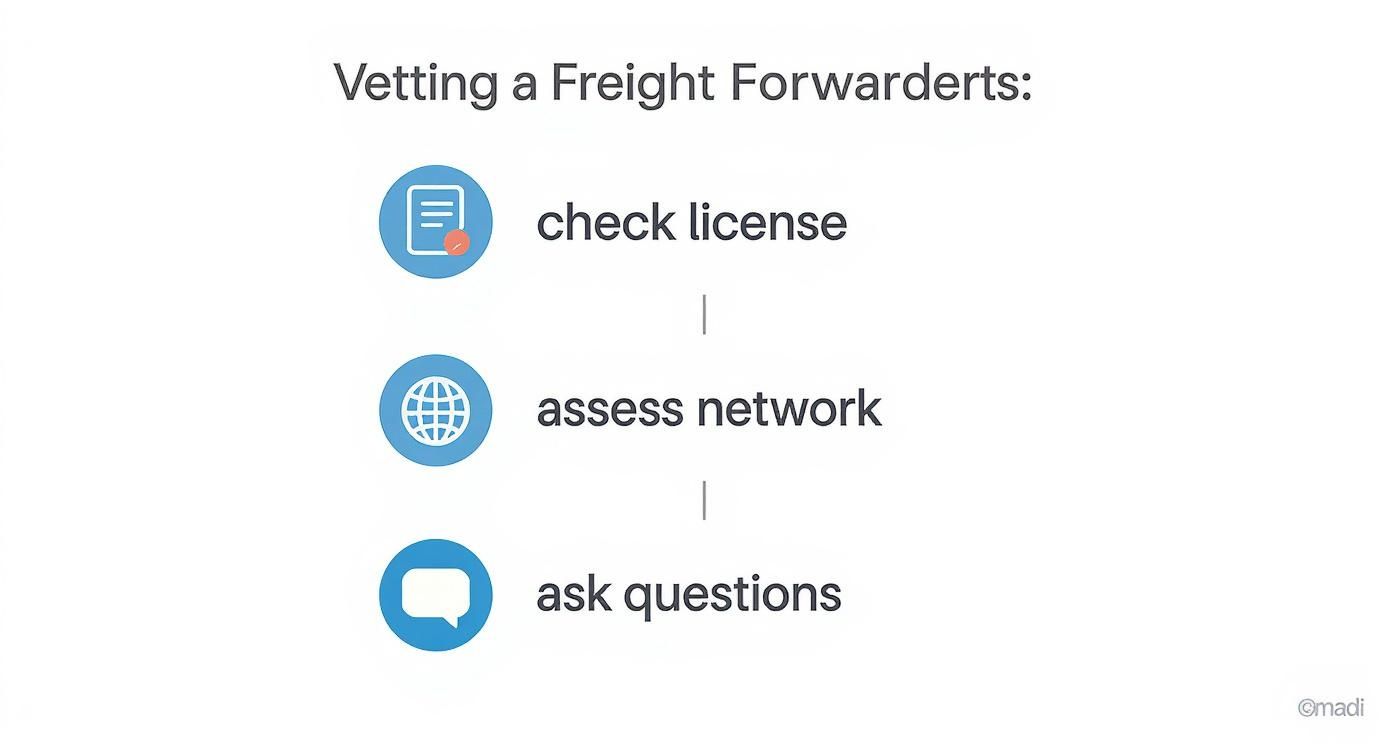
The infographic above hammers home the point: a solid vetting process comes first. Only then can you confidently discuss the best shipping strategy for your specific cargo.
To help you visualise the trade-offs, here’s a quick comparison of the main shipping methods from China.
Shipping Method Comparison China to Global Ports
| Shipping Method | Best For (Cargo Volume) | Relative Cost | Typical Transit Time | Key Advantage |
|---|---|---|---|---|
| FCL Ocean Freight | Large shipments (15+ CBM) | Low | 25-45 days | Security & Speed (for large vol.) |
| LCL Ocean Freight | Small to medium shipments (2-15 CBM) | Very Low | 30-50 days | Cost-effective for smaller cargo |
| Air Freight | Urgent/small shipments (under 500 kg) | High | 3-10 days | Unbeatable speed |
This table gives you a general framework, but your forwarder can provide a precise recommendation based on your exact needs.
Making Sense of Incoterms
Now for the part that sounds complicated but is actually quite simple once you get the hang of it. Incoterms are just a set of universal rules that clearly define who pays for what and when risk transfers from the seller to you, the buyer.
Getting this wrong is one of the most common—and costly—mistakes in international trade.
The Incoterm you agree on with your supplier is not a minor detail; it directly shapes your total cost, your level of risk, and your operational responsibilities. It’s a critical point of negotiation.
Let's look at the two you'll encounter most often:
EXW (Ex Works): This puts almost all the responsibility on your shoulders. The moment your supplier says the goods are ready at their factory door, they're your problem. You have to arrange and pay for everything: pickup in China, export customs, ocean freight, import customs, and final delivery. It offers maximum control, but it also comes with maximum hassle.
FOB (Free On Board): This is a fantastic middle ground and hugely popular for a reason. Your supplier is responsible for all the local costs and logistics to get your goods loaded onto the ship at the Chinese port. As soon as the cargo crosses the ship's rail, it becomes your responsibility. This is often the smart choice, as it leaves the tricky local transport and export documentation to the experts on the ground—your supplier.
Nailing down these terms is fundamental. If you want to explore the full range of options, check out our detailed guide on Incoterms. You can learn more here: https://upfreights.com/blog/incoterms-2025-explained. And as you put your strategy together, it's always wise to look at the best shipping for small business to keep your logistics lean and effective.
Understanding your options is especially critical given the sheer scale of the market you're tapping into. By 2025, China's logistics market is expected to hit an astounding USD 1.31 trillion. In a system that massive, clarity is your greatest asset.
Reading Quotes and Managing Customs Clearance
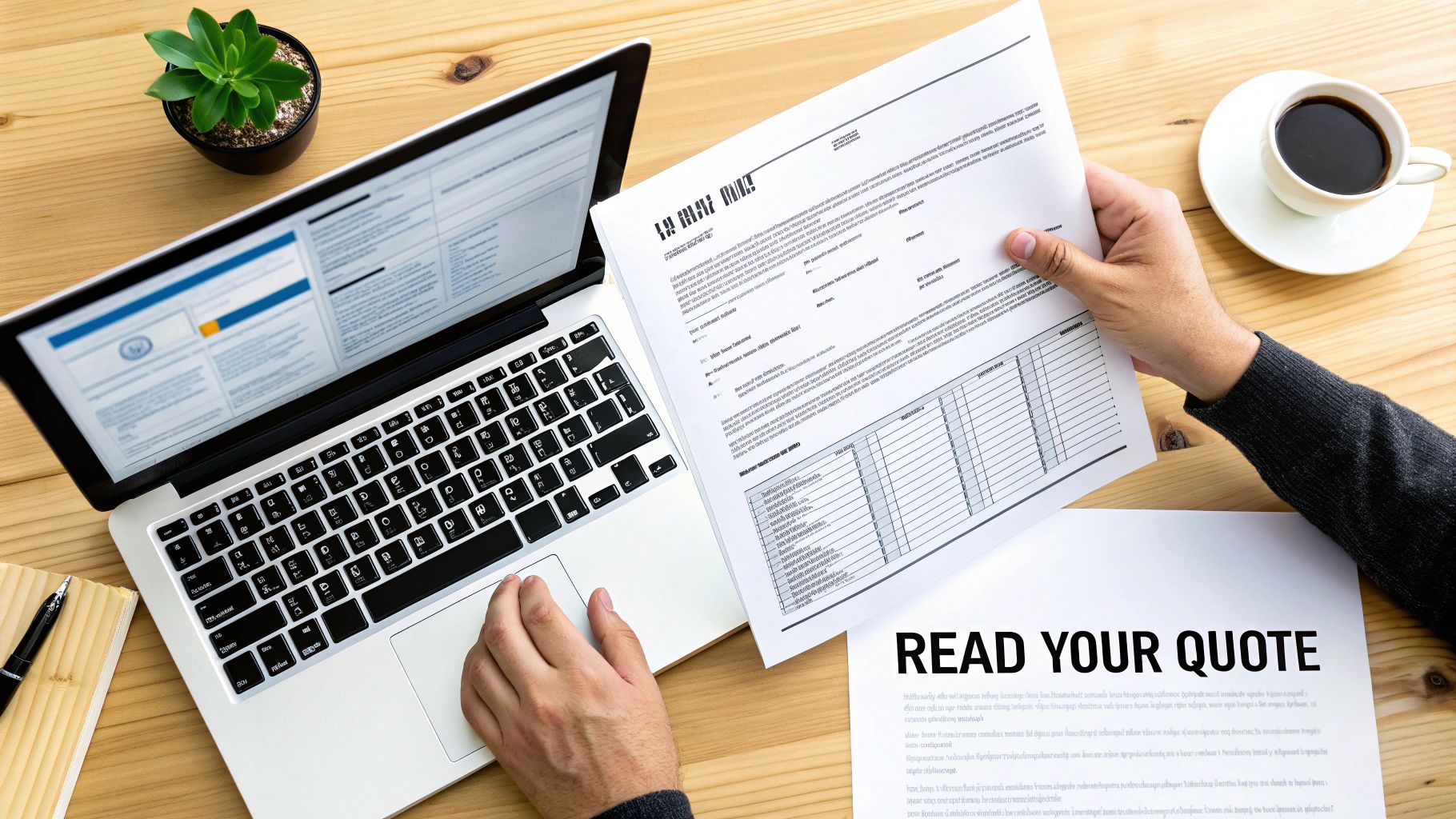
Alright, you've done the legwork and vetted a few forwarders. Now, the quotes are landing in your inbox. It's so tempting to just grab the lowest number and run with it, but hold on. This is precisely where inexperienced importers make their most expensive mistakes.
A cheap initial quote from a freight forwarder in China can be a Trojan horse, stuffed with hidden fees that only show up on the final bill. Learning to dissect a freight quote is a crucial skill. A slightly higher, all-inclusive quote is almost always cheaper in the long run than a bare-bones price that leaves out key charges.
Deconstructing a Freight Forwarding Quote
A legitimate quote won't just give you a single number. It will break down every single cost from the factory floor to your destination. If a forwarder sends you a lump-sum figure with no detail, that's a massive red flag. Transparency is everything in this game.
Here’s what you need to look for on that breakdown:
- Ocean/Air Freight: The main cost of moving your cargo between ports. It's the big, obvious number, but it's just one piece of the puzzle.
- Terminal Handling Charges (THC): Ports on both ends charge these fees for the physical handling of your container—loading, unloading, and moving it around the terminal.
- Bill of Lading (B/L) or Air Waybill (AWB) Fee: A standard administrative fee for creating the legal document for your shipment.
- Export Documentation & Customs Clearance: This is the service fee your forwarder charges for their expertise in preparing and filing the necessary export paperwork with Chinese customs.
And that's just the start. Depending on your Incoterms, you might see charges for local trucking, warehouse storage, fuel surcharges, or destination handling. Your goal is to make a true apples-to-apples comparison, ensuring every potential cost is on the table.
A classic "gotcha" is a forwarder offering a rock-bottom ocean freight rate, only to inflate the destination charges. Always, always get a full door-to-door or port-to-door quote to see the total landed cost before you agree to anything.
The Ever-Changing World of Freight Pricing
You also need to understand that shipping rates aren't set in stone. The market is constantly moving, influenced by global demand, fuel costs, carrier capacity, and even world events.
For instance, not long ago, rates from Shanghai to the U.S. West Coast hovered around USD 2,103 per Forty-foot Equivalent Unit (FEU), while the same container going to the East Coast was closer to USD 3,251/FEU. These numbers shift all the time, which is why having a forwarder who understands the market is so valuable.
Nailing the Customs Clearance Process
Once your shipment is moving, the next big challenge is customs. A smooth customs process means you get your goods on time. A messy one means weeks of delays, eye-watering storage fees, and potential fines.
Your paperwork has to be perfect. A single typo—an incorrect HS code or a mistake in a product description—can flag your shipment for a full inspection. This is where a sharp, detail-oriented forwarder really earns their keep by catching these problems before the documents are submitted.
To get through customs cleanly, you'll need three key documents:
- Commercial Invoice: This lists the seller, buyer, product details, quantities, and values. This value is what customs duties are based on, so it must be 100% accurate.
- Packing List: This details the contents of every box—weights, dimensions, and piece counts. It absolutely must match the Commercial Invoice.
- Bill of Lading (B/L) or Air Waybill (AWB): This is the contract for carriage and title to your goods, issued by your forwarder.
Getting these forms right is non-negotiable. Mismatched information between the packing list and commercial invoice is one of the top reasons for a shipment getting stuck in customs. For a deeper look into this critical step, you can explore our guide on the customs clearance process.
A truly experienced freight forwarder in China won’t just file the papers; they’ll guide you in preparing them flawlessly from the very beginning, making the entire journey that much smoother.
Common Pitfalls to Avoid When Shipping From China
Everyone's journey into international shipping has a learning curve, but some lessons are far more expensive than others. The smartest thing you can do is learn from the mistakes others have made before you. While a good freight forwarder will steer you clear of these traps, knowing what to look out for is your best line of defence.
Think of this as the advice you wish you had before that very first shipment. It's more than a list of warnings; it’s a practical guide to protecting your investment and your schedule.
Choosing a Forwarder on Price Alone
This is easily the most common mistake, and ironically, it's the one that often ends up costing you the most in the end. You get a few quotes, and one comes in dramatically lower than the rest. It feels like you've scored a major win, but I can tell you from experience, it’s almost always a trap.
That "rock-bottom" price is usually a bare-bones quote that conveniently leaves out a whole host of necessary charges. Things like destination terminal handling, customs filing fees, or even fuel surcharges magically appear on the final invoice. It's not uncommon for that final bill to be double the original quote.
A professional forwarder provides a transparent, detailed quote breaking down all anticipated costs. If a price seems too good to be true, it is. You're not just paying for shipping; you're paying for a nasty surprise later on.
Imagine this: you've chosen a cheap forwarder for a shipment of electronics based on a $1,500 quote. But once the container lands, you’re suddenly hit with $1,200 in "destination handling and administrative fees" that were never mentioned. All of a sudden, your fantastic deal is actually more expensive than the all-inclusive quotes you initially ignored.
Under-Insuring Your Cargo
"It'll probably be fine" are famous last words in logistics. So many importers skip cargo insurance to save a couple of hundred pounds, not realising that a carrier's liability is shockingly minimal—often just a few dollars per kilogram. If your £40,000 shipment of goods is lost at sea, you might only get a few hundred pounds back. That's it.
I've seen it happen. An importer shipped a container of beautiful, custom-made furniture. The container was lost during a storm. Because they hadn't taken out proper cargo insurance, they faced a total loss of their investment. Worse, they couldn't fulfil their customer orders, which did serious damage to their reputation.
A good freight forwarder will always bring up comprehensive insurance options. It’s a small price to pay for complete peace of mind and financial protection against the wild, unpredictable nature of global shipping.
Ignoring Chinese National Holidays
Forgetting to plan around major Chinese holidays can bring your entire supply chain to a screeching halt. You absolutely must have these two on your calendar:
- Chinese New Year (CNY): This isn't a single day; it's a multi-week event, typically in late January or February. Factories shut down for two to four weeks, and the ports become an absolute nightmare of congestion both before and after. If your cargo isn’t on a boat before CNY kicks off, it will likely be sitting in China for a month.
- Golden Week: This national holiday starts on October 1st. While it's "only" a week long, the disruption is very similar to CNY. Production stops, and finding space on a vessel becomes extremely difficult and expensive.
Here’s a real-world example: a retailer planning for the Christmas rush failed to get their products shipped before Golden Week. That one-week delay, plus the port congestion that followed, meant their holiday-themed items didn't arrive until the last week of December. They were forced to sell everything at a massive discount. Always, always plan your production and shipping schedules around these critical dates.
Poor Communication with Your Supplier
Your freight forwarder is your logistics expert, but they can't operate in a vacuum. A classic mistake is failing to connect your forwarder and your supplier early in the process. This almost always leads to confusion about who is responsible for what, especially when it comes to the agreed-upon Incoterms.
Let’s say you agreed to FOB (Free On Board) terms, which means your supplier is responsible for getting the goods to the port of origin. But if they have no idea who your forwarder is, they can't coordinate the handover. This can easily lead to your cargo missing its scheduled vessel, causing a domino effect of delays and racking up storage fees at the port.
The fix is incredibly simple: from the very beginning, create a three-way communication channel—you, your supplier, and your forwarder—to make sure everyone is on the same page about the timeline and their responsibilities.
Your China Freight Forwarder Questions Answered
When you're shipping from a market as busy and complex as China's, you're bound to have questions. Getting the right answers is the difference between a smooth-running supply chain and one riddled with costly delays.
Let’s dive into some of the most common questions we hear from importers. Think of this as a practical Q&A session to clear up confusion and help you ship with confidence.
Should I Use a Freight Forwarder or a Shipping Line Directly?
This is a big one, but for almost every business out there—especially small to medium-sized ones—using a freight forwarder is the only practical choice.
Sure, you can technically book space directly with a massive shipping line like Maersk or COSCO. But here's the catch: they only move containers from one port to another. That’s it. They won't arrange the truck to pick up goods from your supplier, they won't handle the mountain of export paperwork, and they certainly won't organise the final delivery to your warehouse. You'd be left juggling all those pieces yourself.
A freight forwarder, on the other hand, is your logistics quarterback.
- They manage the whole show: From the factory floor to your final destination, they coordinate every single step.
- They’re your only option for LCL: Shipping lines don't deal with Less than Container Load (LCL) shipments. Forwarders are the ones who consolidate smaller shipments from various businesses into one container, making it affordable.
- They save you headaches: Their expertise is in navigating the maze of international shipping so you don't have to. It lets you focus on running your business, not becoming a logistics expert overnight.
What's the Difference Between a Freight Forwarder and a Customs Broker?
It's easy to mix these two up, but they have very different jobs that work hand-in-hand.
Think of it this way: your freight forwarder handles the physical journey of your goods. They book the trucks, the ocean vessel or plane, and make sure everything is physically moving from point A to point B.
The customs broker is a licensed specialist who handles the legal entry of your goods into the destination country. Their entire focus is on navigating customs regulations, filing the correct declarations, and ensuring all duties and taxes are paid so your shipment is released without a hitch.
A great freight forwarder won't leave you to find your own broker. They provide a complete door-to-door service by partnering with a trusted customs broker. This gives you one point of contact for the entire process, from pickup all the way through customs clearance.
How Early Should I Book My Shipment from China?
Timing is absolutely critical. Booking too late can mean missing a vessel or paying a fortune for last-minute air freight.
For sea freight, a good baseline is to book at least two to three weeks before your goods are ready to leave the factory. But that's just a starting point. During peak seasons—like the pre-Christmas rush from August to October or the mad dash before Chinese New Year—you need to be much more proactive. In those periods, book four to six weeks in advance to secure space and lock in a reasonable rate.
Air freight is much more forgiving; you can often get space with just a few days' notice. Still, booking a week ahead is a smart move that usually gets you better pricing.
Can a Forwarder Help with Quality Control Inspections?
Your forwarder isn't going to be the one on the factory floor checking your products, but a good one is an essential ally in the quality control process.
They're plugged into the local industry and can recommend reputable third-party QC inspection companies they know and trust. Even better, they can help coordinate the whole thing. Your forwarder can liaise with the factory to schedule the inspection before your cargo is packed up and sent to the port.
This is a crucial step. Finding a quality problem after your goods have crossed the ocean is a nightmare. Using an independent inspector—facilitated by your forwarder—ensures you get exactly what you paid for before it ever leaves China.
Article created using Outrank
